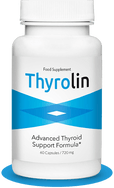Complaining about permanent fatigue, sleepiness, problems with concentration, problems with digestion, skin complaints or emotional instability, we are usually not aware that the cause of these states may be a thyroid dysfunction. Meanwhile, it is the disorders of this organ which often give symptoms suggesting either another disease, or temporary, not requiring any treatment, problems with health.
Table of contents
What is the thyroid gland and what is its role?
This endocrine gland, found in all vertebrates, is of great importance for proper metabolism, hormonal economy and functioning of the whole organism. It is an extremely important condition of our health, therefore any disorders may bring negative, sometimes even irreversible consequences for the body. The function of the thyroid gland is to produce hormones which are necessary for the stabilization of all metabolic processes.
The thyroid hormones are:
- thyroxine – stimulating protein synthesis, fat breakdown and oxidation processes in tissues, influencing the functioning of sexual glands
- triiodothyronine – has a similar function, but is more active than thyroxine
- calcitonin – is responsible for calcium and phosphate metabolism
Inappropriate, too high or too low levels of hormones produced by the thyroid gland lead to pathological phenomena, hyperthyroidism in case of overproduction and hypothyroidism in case of too low levels. Other causes of thyroid disease are pathological changes in the size or structure of this organ, such as tumors or goiters, and finally inflammation resulting in disruption of the normal secretion of hormones.
Comprehensive thyroid support:
Thyrolin

Hypothyroidism – causes
Hypothyroidism can have a variety of causes. If the insufficiency of hormones is due to changes in the structure of the gland, it is called primary hypothyroidism; if it is due to insufficient stimulation from the pituitary gland (which regulates hormone secretion), it is called secondary hypothyroidism. Tertiary hypothyroidism, resulting from insufficient amount of TSH hormone produced by the hypothalamus, is also sometimes observed.
The most common cause of primary hypothyroidism is Hashimoto disease, a chronic autoimmune thyroiditis that causes the immune system to attack the body’s naturally occurring enzymes. It may also be a result of iodine deficiency, total or partial thyroid removal, or radiation to the area of the gland during cancer treatment.
In contrast, damage to or cancer of the pituitary gland sometimes results in secondary or tertiary hypothyroidism, as does sarcoidosis, postpartum thyroiditis, and certain medications.
Hypothyroidism – symptoms
This disease can occur in two forms – latent, otherwise subclinical, or full-blown, otherwise clinical. Latent hyp othyroidism can be difficult to diagnose because it produces non-specific symptoms that are difficult to see or associate with the thyroid gland. These include, for example: chronic fatigue, lethargy, lowered mood, trouble concentrating. It is easy to attribute these symptoms to overwork and ignore them.
Meanwhile, especially if they are accompanied by digestive problems, constant feeling of cold, unjustified weight gain, hair loss and pale and dry skin, then we are dealing with serious disorders resulting from a decrease in hormone levels.
In the case of clinical hypothyroidism , the symptoms are so severe that they cannot be overlooked, what is more, they make normal functioning impossible. In addition to the above mentioned, there may be:
- dyspnea
- motor and mental retardation
- swelling
- stiffness and pain in the joints
- depression
- emotional instability
- disorders of libido and reproductive processes
Untreated hypothyroidism may lead to very negative, sometimes irreversible effects on the whole body. These are such disorders as: increase of cholesterol level in blood, slowing down of heart work, decrease of pulse rate and blood pressure, accumulation of fluid in pericardial sac or abdominal cavity, hypertrophy of heart, degeneration of gastric mucous membrane, swelling within the neck, or goiter, weakness or loss of hearing.
Hypothyroidism – treatment and prevention
In order to diagnose hypothyroidism, a thyrotropic hormone (TSH) test is used, which allows even the asymptomatic form of hypothyroidism to be diagnosed. Treatment in most cases means long-term, oral administration of synthetic thyroid hormones to restore adequate levels in the body.
Many people believe that the most effective medication is iodine for the thyroid. It is indeed an essential element for the production of thyroid hormones, but its supplementation in the case of hypothyroidism is used rather rarely, mainly when it comes to pregnant women. Poland is counted among areas with sufficient supply of iodine, not only because of its content in the air but also because of the availability of iodized salt. Therefore, iodine supplementation is generally carried out in cases of iodine deficiency or during periods of increased demand.
On the other hand, prevention plays an extremely important role. It is primarily about physical activity and diet. The proper diet for hypothyroidism includes products containing iodine, iron, zinc and selenium. Iodine can be found in marine fish and shellfish, iron in meat and cereal products, zinc in seeds, seeds, groats, whole grain products, selenium in fish and seafood, mushrooms, garlic, legumes.
Herbs for hypothyroidism basically play a supportive role. Herbal treatment includes such plants as bladderwrack containing large amounts of iodine, licorice, flaxseed, evening primrose, ashwagandha, Indian nettle, ginger, cud, Indian balm, bird’s-foot trefoil, among others. Specially formulated herbal blends or supplements containing herbs and other natural bioactive substances to support thyroid function, such as Thyrolin, are also used.
You may be interested in:
- Diet in hypothyroidism
- Iodine deficiency

